
In 2018, Immersive VR Education became the first New Frontiers startup to be listed on the Irish Stock Exchange’s Enterprise Securities Market. Just four short years after it was founded, Sandra and David Whelan’s company went public with a valuation of around €21.6 million, the first Irish tech firm to be listed on the exchange since its inception.
How did the company create an offering that has landed it clients such as the BBC, JESS Dubai, Oculus, and the University of Oxford? We spoke to Sandra Whelan, co-founder and Chief Operating Officer, to discover what goes into building the team that drives a successful tech startup.
Q1. Everyone has their own route to startup. Where did your business idea come from? How did it all come about?
It all began when my husband, David, saw a Kickstarter project for a virtual reality headset called the Oculus Rift. He invested, and sometime later the headset turned up at the house. We all tried it out – David and I, and our three children. The technology wasn’t very advanced at that point, but I could see the potential. We all recalled information we’d seen much better than we would from reading a book. It was evident to me that there were a lot more useful applications for this than what was available, especially in education.
This is what got David interested in the sector. He started a site to review VR technology – called Virtual Reality Reviewer, very original! Running that site is what led to us realising there was a gap in the market for educational solutions using VR. We created our own Kickstarter for a project involving the Apollo 11 mission. That gave up 30 days to raise €30,000 and we actually raised €36,000! That’s the moment we knew we had hit on something that could work. David sold his web design business and Immersive VR Education was born.
Through the Local Enterprise Office in Waterford, we were pointed in the direction of New Frontiers. David went through the whole programme and it was absolutely brilliant. He learnt all about the financial projections we needed to do, how to formulate a business plan, and how to pitch it. Before this, he had no experience of public speaking or pitching to investors.
It was evident at that stage that if we were going to go ahead with it, I would need to be involved in a bigger way. Up until then, I was working full-time as a logistics manager while working on this in the evenings. I was going to have to give up my job, which was scary because we have a house and three kids to look after. But we felt that we’re either going to give it 100% or we’re not. David was so passionate too and he really believed in the idea, so I thought, OK, let’s do this together.
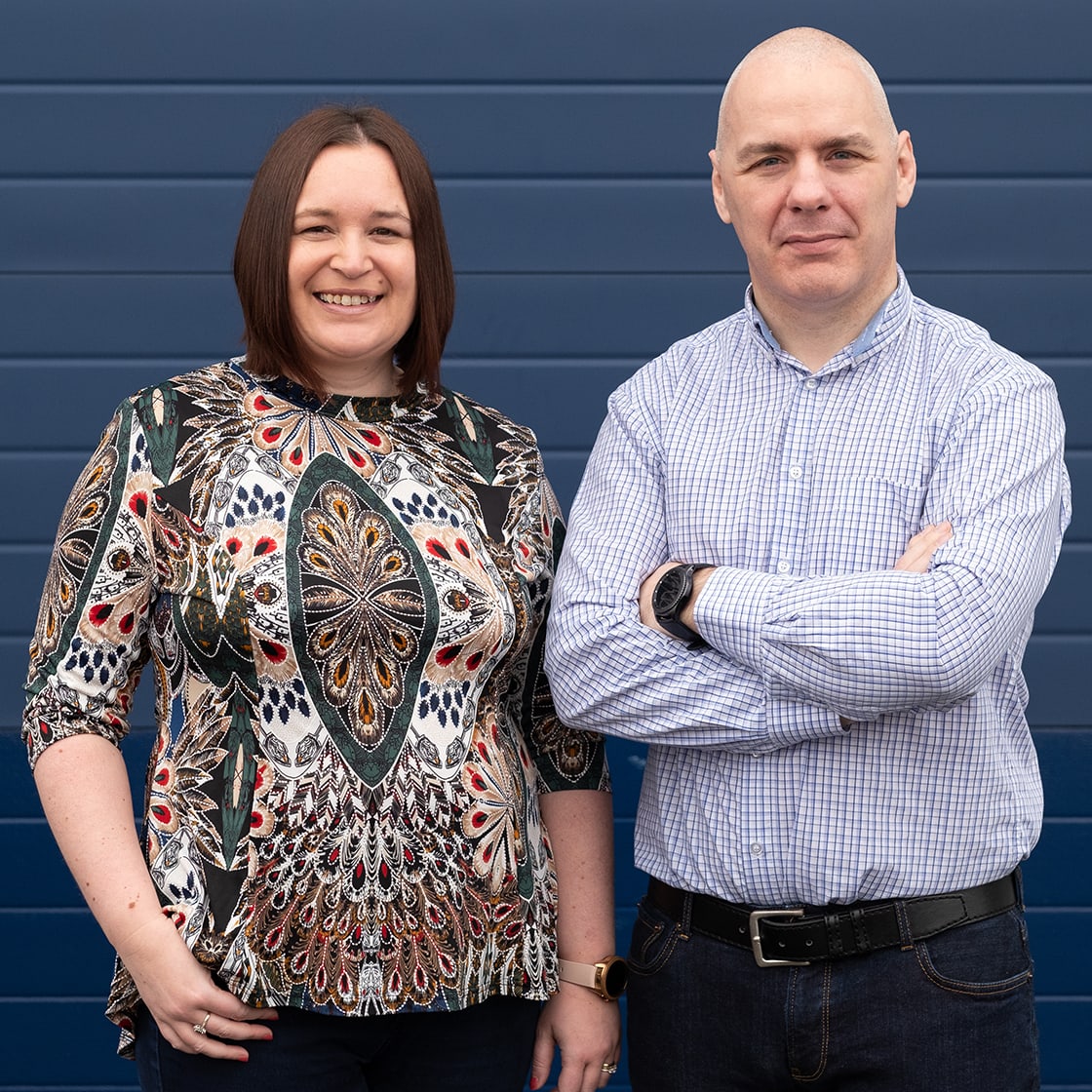
Sandra Whelan with her husband and co-founder, David Whelan, CEO of Immersive VR Education
Q2. It is a very niche business you’re in, so how did you go about growing a team?
In January 2016 we moved into our new office, and that’s when we made our first hire: Mike Armstrong. Mike was someone we met through the Virtual Reality Reviewer website, so we already knew him. He is now the Lead Technical Developer for our platform. He actually moved over from America with his girlfriend who he has since married and they now have two beautiful children. By permanently relocating, Mike really has come along the whole journey with us.
To make our second hire, we held a VR party in our office. We thought that if we put out the invite on the right messenger boards and explained that anyone interested in working in VR should come along, then we might find the perfect fourth member of our team. That’s how we met Bobby. So, our first two hires were pretty unorthodox, but after that, we started using LinkedIn and recruitment agencies to hire people.
Q3. Did you have a recruitment strategy?
Initially, our strategy was very much determined by the business plan David had developed on New Frontiers, because that was how we secured funding in the first place. In the business plan, we had stated how many developers we needed, so we always knew this was what that money would go towards. We started by putting up ads on LinkedIn and our own website, but there was nothing really coming through.
The skills we were looking for were not available in Ireland at that stage, so we started to look further afield with recruitment agencies. The result is that today only 10 of our team are Irish, and the rest are either American, European, or Argentinian. We do use Indeed sometimes, but a lot of our hires are through recruitment agencies. The fees for recruitment agencies can be on the high side, but we find it is worth it because it saves us a lot of time and we end up with people who are fully qualified for the position.
Q4. How does hiring people from abroad work in practice? What kind of interview process do you have?
We have a relocation package available for people which comprises of us finding them a house, putting down a deposit on the house, providing their first month’s rent, covering moving costs and also paying for their flights. It is something I took responsibility for from the beginning and I have helped relocate numerous candidates at this point. As you can imagine, it is time-consuming, so it helps that the recruitment agency takes control of the other side of the process. We don’t meet the hires face-to-face until they arrive in Ireland, but we do have Skype interviews.
The first interview with potential candidates is held over Skype and would be a technical interview. Depending on the position applied for we will get them to do a test that they could send back in four or five days. The next stage would be an interview with David and myself, because even though someone may be technically fantastic that doesn’t necessarily mean they are a good fit. For me, that’s more important than anything else and it has been the reason I’ve turned down very good technical people. I know the team they are going to have to work in and if I don’t think they will fit in there is no point in hiring them, no matter how talented they are from a technical point of view.
Q5. Considering your background isn’t in people management, why do you think you’ve been so successful at building a team?
It was a steep learning curve because I don’t have a background in people management. However, before this I was a client manager, so I am good at understanding people. I think it helps that I’m very hands-on in my role. There is no HR manager, it is just me and has been from the beginning, so I get to know everyone individually and I love that. I understand their little nuances and help them get settled when they arrive. Of course, it was more challenging as we grew. We started with a four-person team in January 2016 but that quickly grew to seven people, then 10, then 12 and by March 2018 we had 21 people. Today we have nearly 40 but I think the culture we’ve managed to nurture here is key to our success.
We have a very diverse team with people coming from all kinds of background, which is fantastic, but it also needs to be managed carefully. We decided from the outset to be very transparent by letting people know exactly what we expect from them. We have a very relaxed environment at VR Education, and I am happy as long as the work gets done. That’s why, when someone new starts at the company, we explain how relaxed the work culture is here but make sure to point out that at the same time they cannot take advantage of this.
I also make sure the team receives a lot of feedback. Because of what we do, the workday is mostly people sitting at computers with their headphones in, so I like to give people time to talk. I make sure everyone gets one-to-one feedback from their line manager every month. There is no point in me living in a happy rose-tinted bubble in my office, not knowing what is actually going on outside and there is nothing worse than letting problems fester. So it’s important to give people a chance to air any issues they have at these meetings.
Q6. Is there an example of a problem you came across that you found a solution for?
I noticed in the mornings when people came in there would be a lot of yawning going on. I decided it would be a good idea to push the morning meeting back because people weren’t exactly firing on all cylinders! But we also didn’t want anyone getting burnt out because they all work very hard. That’s why I went a step further and offered the team the option of working a four-day week every second week, as long as they had their work done. I thought this would be great for people travelling back and forth from the UK and Europe to visit their families.
It was voluntary, and about half the staff tried it. But in our feedback sessions, we found out that in reality, people were becoming more exhausted by trying to squeeze a full week of work into four days! It was at this point I asked them if there was a solution that they felt would work better. In the end, the introduction of core hours was the answer because everyone was able to design a workweek that would suit them best. Those up early dropping off kids at school were happy to start earlier and finish earlier, while those who felt like they were only really awake at 10 am could push their day forward. Being able to talk and listen to people in this way means we can get the most out of the team and they can get the most out of their job.
Q7. Are there any other perks you offer your staff?
We offer two team-building events every year, the Christmas one and the summer one. That’s always great fun. We close every Good Friday and we do a full shut down over Christmas, but it’s not counted against people’s holiday entitlement. We hold game competitions in the common area of the office to encourage people to get away from their desks. We also have a fully stocked canteen.
Q8. Do you have any top tips for start-ups trying to build a great team?
Ask your team what they want. I could guess what would work best for everyone, but that’s just my opinion. I think getting real feedback is essential to determine what is and is not working. Also, we try not to differentiate between management and everyone else. I have my office, but my door is physically always open for people to come in and out. Our management team have their desks out on the floor with everyone else. After all, when it comes down to it, we all work for the same company and our goal is exactly the same.
Another thing that I had to learn myself over time was to not be too swayed by other people’s recommendations for potential hires. I found that I have had many hours wasted by talking with someone about a role based on a recommendation. Always make up your own mind on matters like that because you know your company and your team and what works somewhere else won’t necessarily work for you.
To find our more about Immersive VR Education, read our article about their IPO last year or visit their website.
About the author
 Scarlet Bierman
Scarlet Bierman
Scarlet Bierman is a content consultant, commissioned by Enterprise Ireland to fulfil the role of Editor of the New Frontiers website. She is an expert in designing and executing ethical marketing strategies and passionate about helping businesses to develop a quality online presence.
Recent articles
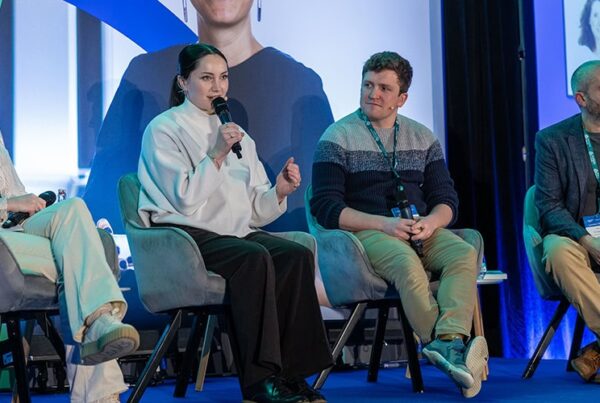
The New Frontiers Programme Connects 158 Founders With Success Stories

Raise Your Startup’s Visibility & Credibility By Entering These Competitions

Founder Perspectives: Lessons From Building Businesses In Sustainability

Tech Startups In The Age Of AI: Alumnus Paul Savage On Speed, Quality & Risk
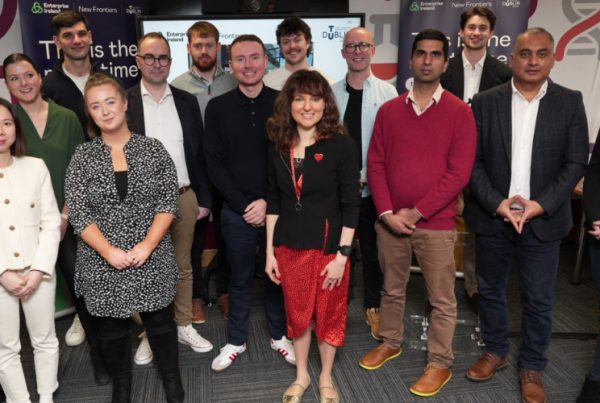
Fourteen Startup Founders Graduate From Phase 2 Of New Frontiers In Tallaght
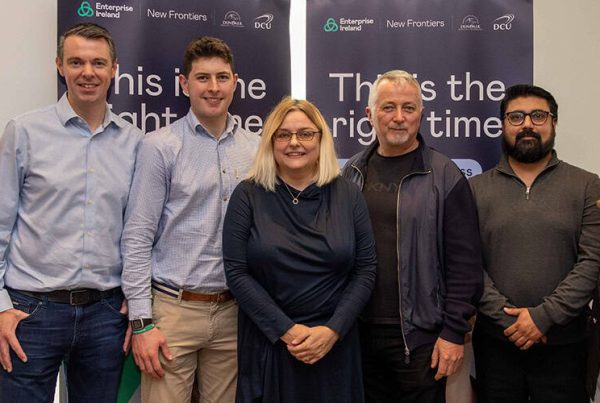
Eleven Founders Graduate From New Frontiers In The Border Mid-East Region

Laying The Right Groundwork Helps Startups Prepare For Export Success
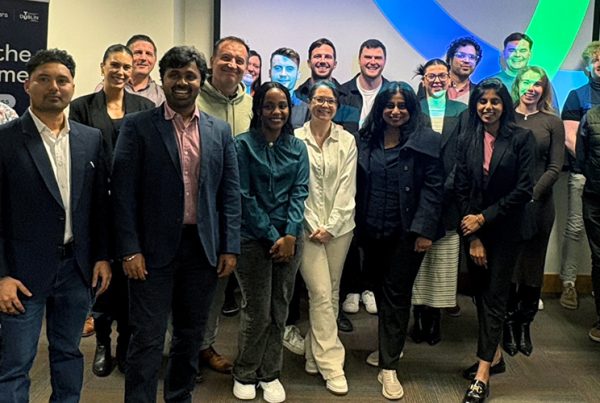
 Scarlet Bierman
Scarlet Bierman
